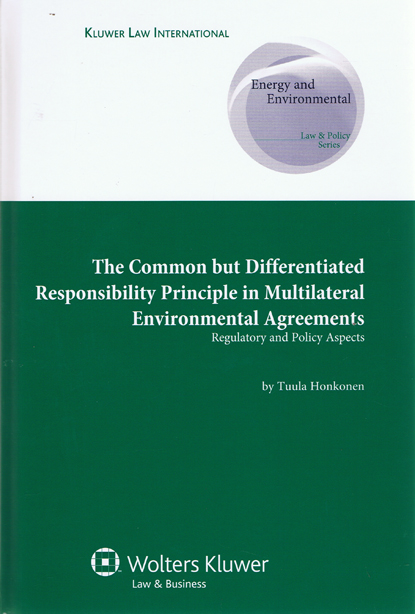The Common but Differentiated Responsibility Principle in Multilateral Environmental Agreements: Regulatory and Policy Aspects
ISBN13: 9789041131539
Published: September 2009
Publisher: Kluwer Law International
Country of Publication: The Netherlands
Format: Hardback
Despatched in 10 to 12 days.
Built in to every multilateral environmental agreement is a dilemma: how to incorporate justice and fairness on the one hand and effectiveness on the other. Our immense difficulty in meeting this two-edged imperative highlights the fact that we are, at best, at an early stage in the development of international environmental ethics, and that no coherent and effective ethical system yet exists in this context. This remarkable book starts from a conviction that the principle of common but differentiated responsibility (CBDR) offers the best way forward toward the much-desired goal of sustainable development.
Presenting a full-scale, multidisciplinary assessment of the feasibility of the principle of CBDR in multilateral environmental agreements, encompassing legal and policy status perspectives as well as historical developments and future prospects, this study identifies issues and aspects in the theoretical and practical application of the CBDR principle. The author responds with in-depth knowledge and awareness to such specific questions as the following:
- What does the principle of common but differentiated responsibility entail in international environmental law, with special reference to international environmental treaties?
- How is the principle reflected in the burden-sharing design of current agreements?
- What problems and challenges does the practical application of the CBDR principle present to the international community and individual countries as well as to the international environmental regimes themselves?
- What factors should be taken into account when assessing the success or failure of the principle?
- What is the status of the principle in international environmental law (currently and possibly in the future), and what are its implications in the broader international context?
The author examines methods for differentiation from both theoretical and actual treaty-level viewpoints. She offers examples from the negotiation history of international environmental treaties to shed light on the importance of information-sharing and wide participation during the negotiations. Recognizing that, in the international environmental field, problems of economic development and the geopolitics of global wealth distribution soon come to the fore, and that each state’s right to development should not be too heavily restricted under international environmental regimes, she demonstrates that the CBDR principle has a strong potential to formally integrate the environment and development at the international level.
The study will be of immeasurable value in promoting understanding of how CBDR actually works. It will help lawyers and policymakers perceive how different parties want to use the principle, and to discern clearly what options could be chosen by the parties, which aspects are crucial, and what factors influence the effectiveness of the arrangements.
